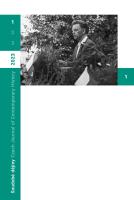Politicky rozporný odkaz absolutní oběti
The Politically Contradictory Legacy of Absolute Sacrifice
Author(s): Kateřina SixtováSubject(s): History, Cultural history, Post-War period (1950 - 1989), Transformation Period (1990 - 2010), Present Times (2010 - today), History of Communism, Post-Communist Transformation, Book-Review, Politics of History/Memory
Published by: AV ČR - Akademie věd České republiky - Ústav pro soudobé dějiny
Keywords: Jan Palach;Oskar Brüsewitz;Czechoslovakia;German Democratic Republic (GDR);Czech Republic;Germany;politics of memory;remembering;political martyrs;state socialism;dissent;evangelical church
Summary/Abstract: The German historian Sabine Stach’s monograph "Politika odkazu: Jan Palach a Oskar Brüsewitz jako političtí mučedníci" is a Czech translation of her published PhD thesis "Vermächtnispolitik: Jan Palach und Oskar Brüsewitz als politische Märtyrer" (Göttingen, Wallstein 2016) in which she examines, from the perspective of the culture and politics of memory, two cases of politically motivated suicides in socialist Czechoslovakia and the German Democratic Republic: the self-immolation of the university student Jan Palach (1948–1969) on 16 January 1969 on Wenceslas Square in Prague; and the evangelical pastor Oskar Brüsewitz (1929–1976) on 18 August 1976 in a public market in the Saxon town of Zeitz. While the better-known Palach tried to arouse Czechoslovak society to resist the Soviet occupation and the so-called normalization of conditions, Brüsewitz protested primarily against the socialist and atheist education of East German youth. In her comprehensive work, Stach recalls the political context of both events. Based on a discursive analysis of the recollections, she offers a complex picture of how these personalities who, through their own decision and idealistic motives, sacrificed their lives, have been commemorated in the dissent of their countries, in the East German Protestant Church and in West Germany, and also, after 1990, in Czechoslovakia and the Czech Republic and the Bundesrepublic. In doing so, Stach points out the difficulties of appropriating the political legacy of such an extreme act and the dilemma between the martyr and hero narratives and their contestation. The reviewer concludes by claiming that Stach meritoriously debunks some of the myths that have survived in connection with Palach and Brüsewitz to the present day.
Journal: Soudobé Dějiny
- Issue Year: XXX/2023
- Issue No: 1
- Page Range: 286-292
- Page Count: 7
- Language: Czech

